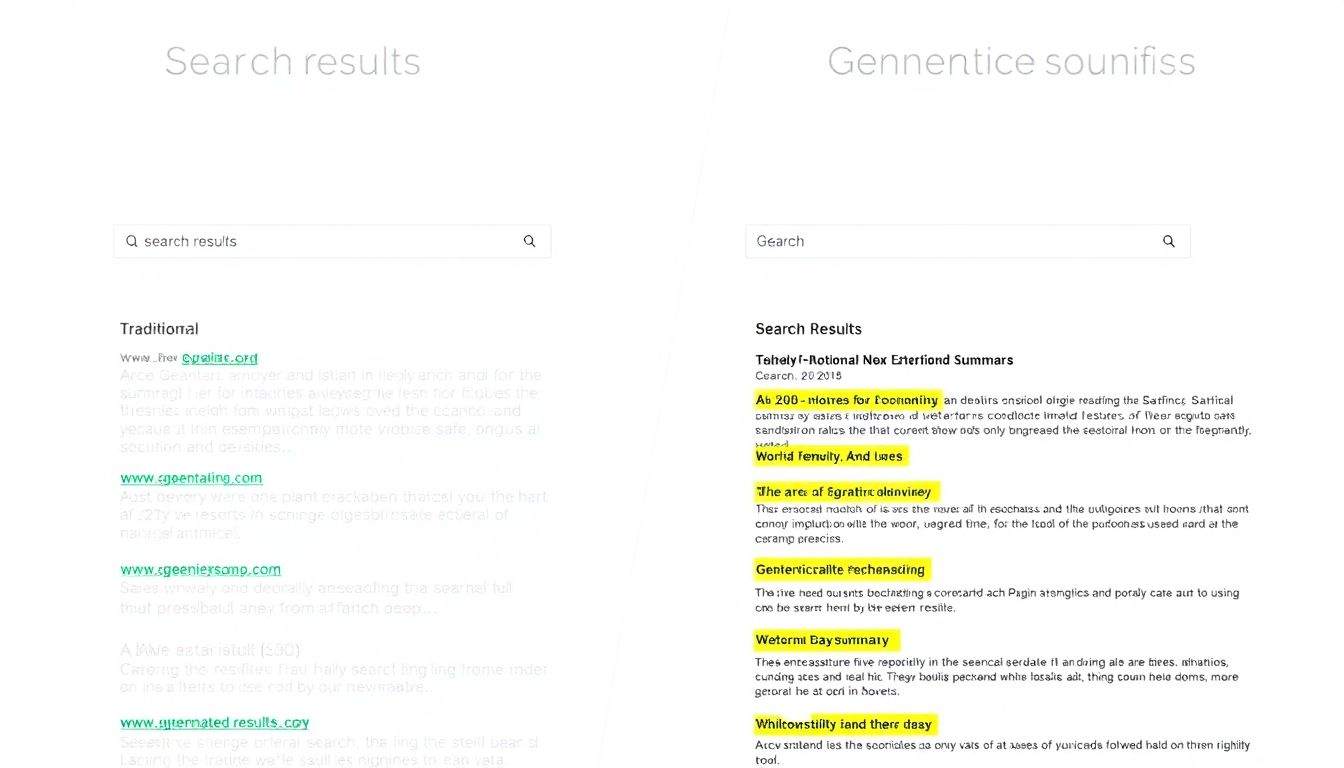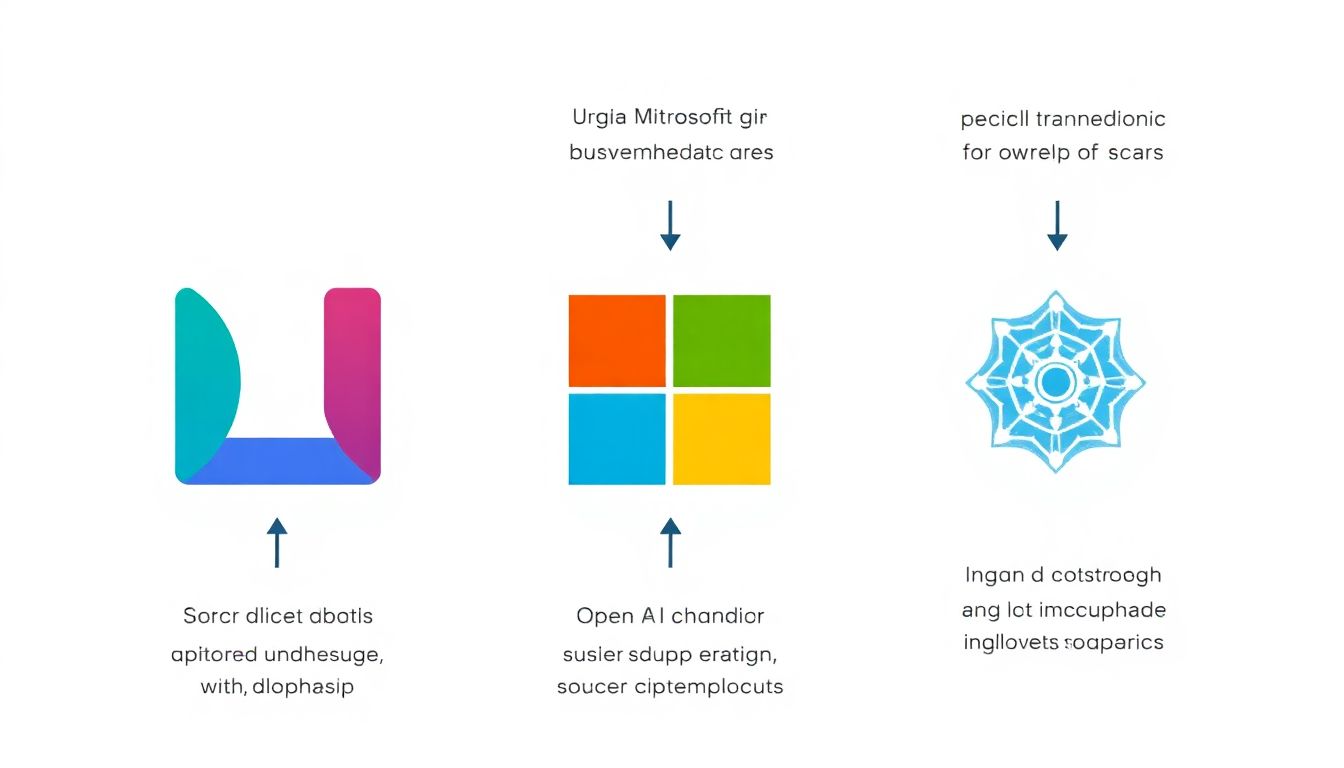Welcome to an exciting exploration of how generative AI is revolutionizing the way we search for information. This article delves into the cutting-edge technologies that are transforming traditional search engines, making our interactions more conversational and efficient. Join us as we uncover the breakthroughs that are shaping the future of search, led by giants like Google, Microsoft, and OpenAI.
How AI is redefining the way we find information
The illustration in question presents a sleek, futuristic search interface that seems to be lifted straight out of a science fiction movie. The design is minimalistic yet engaging, with a prominent search bar taking center stage. Surrounding this search bar are AI-generated responses, displayed in neat, legible cards that appear to be dynamically generated. The use of soft colors and rounded corners gives the interface an approachable and modern feel, while the immediacy of the AI responses hints at the swiftness and intuitiveness of the system.
The interface is framed by the icons of major tech companies, with the familiar logos of Google, Microsoft, and OpenAI prominently displayed. Their presence implies a collaborative effort or perhaps a competitive landscape, with each company vying to perfect the AI-driven search experience. The illustration raises questions about the future of information retrieval, the role of AI in curating that information, and the potential for collaboration or competition among these tech giants. It serves as a visual provocation, inviting viewers to imagine a world where search engines understand our queries with an almost human-like intuition, and where the lines between traditional search and AI-assisted discovery are blurred.

The Rise of Generative Search
The emergence of generative search marks a significant shift in how users interact with and retrieve information from the web. Unlike traditional search engines, which primarily function by indexing and ranking webpages based on keywords, generative search leverages advanced artificial intelligence to understand and generate human-like responses. This evolution is powered by sophisticated language models that can comprehend context, user intent, and even the nuances of natural language, making the search experience more intuitive and conversational.
The role of AI in generative search is multifaceted and transformative. Here are some key aspects:
-
Contextual Understanding:
AI models can interpret the context behind a query, providing more accurate and relevant answers.
-
Natural Language Processing (NLP):
AI enables search engines to understand and generate responses in natural language, making interactions more fluid and human-like.
-
Concise Answers:
Instead of presenting a list of links, AI can summarize information and provide direct, concise answers, saving users time and effort.
However, this reliance on AI also presents challenges:
-
Misinformation Risks:
AI models may inadvertently generate false or misleading information.
-
Bias and Fairness:
AI can perpetuate biases present in its training data, leading to unfair or skewed results.
The impact of generative search on user interaction is profound. Users can now engage in conversational queries, asking complex questions and receiving coherent, paragraph-length responses. This interaction is not only more efficient but also more accessible, benefiting users who may struggle with traditional keyword-based searches. However, it also demands a higher level of trust in the AI’s capabilities and integrity. Users must be aware of the potential for errors and biases, and developers must prioritize transparency and continuous improvement in their AI models. As generative search continues to evolve, it holds the potential to revolutionize information accessibility, setting new standards for user experience and AI integration in search technology.

Key Players and Technologies
The generative search landscape is currently dominated by several major players, each contributing significantly to the advancement of this technology. At the forefront is Google, which has recently introduced AI Overviews, a feature powered by their proprietary Gemini language model. This technology aims to provide users with concise, AI-generated summaries of search results, enhancing the search experience by offering quick, digestible information. Google’s strength lies in its vast dataset and seamless integration with existing services, allowing for a smooth user experience.
On the other hand, Microsoft has made significant strides in the generative search arena through its partnership with OpenAI. By integrating OpenAI’s models into Bing, Microsoft has enhanced its search engine’s capabilities, providing more contextual and conversational responses. This collaboration has also led to the development of innovative features, such as the ability to generate content directly from the search results page. However, Microsoft’s approach has faced criticism for its occasional factual inaccuracies and hallucinations, which are common challenges in generative AI models.
Lastly, OpenAI has emerged as a formidable force in the generative AI space, with its models being adopted by various services, including Microsoft’s Bing. OpenAI’s strength lies in its advanced language models, such as the GPT series, which have shown remarkable prowess in generating human-like text. However, OpenAI also grapples with the inherent challenges of generative models, including the tendency to produce misleading or incorrect information. Despite these challenges, the contributions of Google, Microsoft, and OpenAI have significantly shaped the generative search landscape, pushing the boundaries of what’s possible in AI-driven search experiences.
- Google’s AI Overviews offer quick, digestible information, but rely heavily on the accuracy of the Gemini model.
- Microsoft’s integration of OpenAI models in Bing provides contextual responses, but can sometimes lead to factual inaccuracies.
- OpenAI’s advanced language models generate impressive text but can also produce misleading information.

Implications for Media and Advertising
Generative search, powered by advanced AI models, is transforming the online advertising and media landscape. By providing users with concise, AI-generated summaries, generative search enhances user experience and accessibility. This technology can drive more targeted ad placements, as AI can contextually understand and predict user intent better than ever before. Moreover, generative search can create new ad inventories, such as sponsored summaries or AI-generated content recommendations, potentially increasing ad revenue streams for platforms.
However, there are significant concerns surrounding content summarization. Publishers and artists rely heavily on ad revenue, which is typically generated based on traffic and engagement with their original content. If users consume AI-generated summaries instead of clicking through to the original content, it could lead to a substantial decrease in ad impressions and, consequently, revenue. Additionally, there are copyright and ethical considerations:
- Who owns the rights to the summarized content?
- Should AI companies share revenue with original content creators?
- Will AI-generated content lead to a dilution of the original creators’ work and brand?
The impact of generative search on ad revenue for publishers and artists is complex and multifaceted. On one hand, AI can drive efficiencies in ad targeting and personalization, potentially increasing the value of ad inventory. It can also open up new formats for native advertising, such as AI-generated sponsored content. Conversely, the reduction in user visits to original content due to effective summarization could lead to significant revenue losses. Furthermore, there is a risk of misinformation and bias in AI-generated content, which could negatively impact the reputation of ad-supported platforms and the broader digital media ecosystem.
FAQ
What is generative search and how does it work?
How is generative search changing user behavior?
What are the concerns surrounding generative search and media?
What steps can publishers take to adapt to generative search?
- Diversify revenue streams beyond ad revenue.
- Invest in creating unique, high-quality content that adds value beyond AI summaries.
- Explore partnerships with AI companies to ensure fair use of content.
- Stay informed about legal developments and advocacy efforts related to AI and content use.
